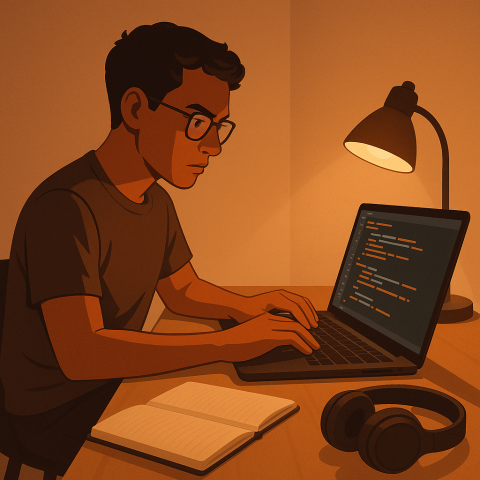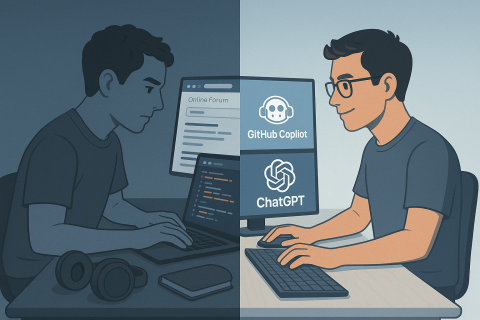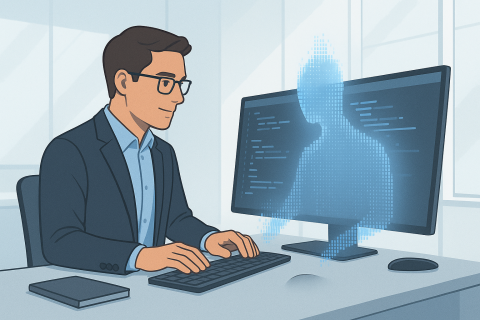Being a developer can be both exciting and difficult. Whether you're creating or coding UIs, working with various backends, or exploring the newest AI models, the work isn’t always easy. Deadlines can be tight, project goals can change, and there's the added pressure to keep up with and learn the latest trends, all of which can make it hard to stay motivated, even if you really enjoy coding.
Fortunately, in 2025, developers have a new helpful “partner”: artificial intelligence (AI). Instead of replacing programmers, AI now serves as a useful tool that can help unlock creativity, make work more efficient, and keep enthusiasm alive.
My Path as a Self-Taught Developer
Four years before I started working at Zivtech, while working at my current job as a Childcare/Mental Health worker, I set out to make a career change. I started teaching myself to be a developer.

My learning environment was a mix of online tutorials and open-source projects, I would code for a few hours each day as soon as I got home from work. My main motivation was my own drive to learn. Without traditional classroom lessons, I had to create my own plan and set my own deadlines.
What kept me going were small but steady achievements, things like finishing a side project, fixing a difficult bug, doing some coding challenges, or finally understanding how a tricky API worked. Sharing my code on GitHub and talking with other developers helped me feel part of a community and kept me accountable.
Transitioning from Self-Taught to Professional pre-AI and Then With AI
When I first started learning to code, AI tools weren’t part of my everyday workflow. Debugging meant browsing online forums, searching through Stack Overflow (and similar sites), and trying different solutions until something worked. Every problem I fixed on my own improved my problem-solving skills and helped me understand the basics better.

Nowadays, we have AI helpers like GitHub Copilot and ChatGPT. At first, I was worried that relying on AI might weaken the skills I had worked hard to develop. But I realized it was quite the opposite:
AI made repetitive tasks faster, things like code refactoring or code documentation got done quicker allowing me to focus on coming up with solutions. In addition to that, suggestions from AI introduced me to patterns and techniques I might not have discovered on my own. I was able to use those suggestions and further look into what the code meant and how it’s used, allowing me to expand my knowledge base of Drupal and PHP.
The change wasn’t about replacing my hard-earned skills; it was about boosting them. AI transformed the knowledge I had built through effort into a stronger foundation I am able to use every day at work.
Automate the Boring Stuff
Repetitive tasks are motivation killers. Writing the same boilerplate, fixing simple syntax errors, or even just doing the same small tasks over and over can get boring fast.
- AI assistants can generate function templates, suggest refactors, and even write tests for you.
- Tools like GitHub Copilot, Claude, OpenAI, Gemini, etc. can be used in various ways to speed up or even automate those boring tasks.
Use AI as a Learning Partner
The tech landscape evolves at lightning speed. New frameworks, languages, and best practices can feel overwhelming but AI can help you keep up.
- On-demand explanations: Stuck on a concept? AI chatbots can break it down in plain language or provide step-by-step examples.
- Personalized learning: Platforms like Windsurf or OpenAI’s assistants can suggest resources that match what you’re working on or where you need more practice.
When learning feels more accessible, you’re less likely to burn out and more likely to stay excited about your craft.
Pair Programming with an AI “Teammate”
Pair programming, where two people work together on the same code, has usually been done with another person. Now, AI can serve as a helpful partner, offering suggestions to improve your code or even spotting mistakes. This “always-available teammate” helps maintain momentum even when your colleagues are in a different time zone.

Remember the Human Side
Your overall well-being and mental health are also big aspects in staying motivated. Make sure to take breaks so you don’t get overwhelmed. Using timers or smart apps can help remind you when it’s time to step back and rest.
Also, sharing your successes and challenges with others, whether it’s with your co-workers on Slack, Discord, or open-source forums can help keep your enthusiasm alive.
Final Thoughts
Staying motivated as a developer isn’t about working harder, but about working smarter. AI shouldn’t replace your creativity; it should help boost it. By using AI to handle routine tasks, learn new skills faster, and keep everything organized, you can spend more time doing what originally drew you to development: creating meaningful things.
From my early days of fixing bugs without AI to now working at Zivtech where I use AI every day, one thing is clear: motivation grows when curiosity is combined with the right tools. The future of development is a collaboration between human creativity and machine intelligence, and you’ll find it easier than ever to stay motivated, inspired, and excited about the code you write.
